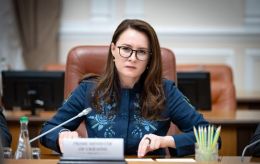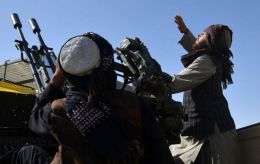Not only Patriot: How Romania secretly helps Ukraine amid economic tensions
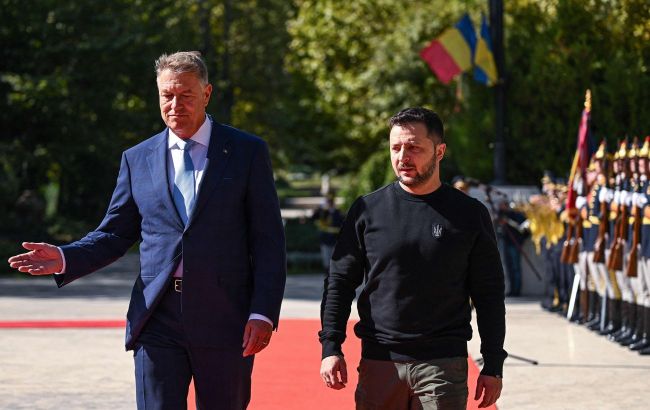 Ukrainian President Volodymyr Zelenskyy and Romanian President Klaus Iohannis (photo: Getty Images)
Ukrainian President Volodymyr Zelenskyy and Romanian President Klaus Iohannis (photo: Getty Images)
Romania supplies weapons to Ukraine and assists with exports through its ports but often does so non-publicly.
What lies behind this neighbor's position, and what can Ukraine expect next - in the material by RBC-Ukraine.
Contents
- Romania's assistance to Ukraine
- Why Romania changed its position
- Problems on hold: Economy and national minorities
- Situation in Romania and how it might affect support for Ukraine
Romania's assistance to Ukraine
Romania has been providing military aid to Ukraine since the beginning of the large-scale war, but it has done so non-publicly. Intelligence from open sources has identified Romanian TAB-71 armored personnel carriers and APR-40 multiple rocket launchers on the battlefield. However, Bucharest officially remained silent until this May, when the Romanian president, Klaus Iohannis, met with his American counterpart, Joe Biden.
Romania has supplied Ukraine not only with TAB-71s and APR-40s but also howitzers, 122mm and 152mm shells, grenade launchers, DShK machine guns, and much more.
"It is a decision taken for practical reasons, not to permit the Russian secret services to gather too much information from public sources, but also not to permit the use of this kind of data in the ongoing Russian hybrid war," explained Romanian international affairs expert Mihai Isac in a comment to RBC-Ukraine.
Another reason is that the ruling coalition did not want to provide grounds for criticism from pro-Russian parties in Romania.
In addition to this, Romania has been more active within NATO.
In March of this year, work began expanding the military complex at the 57th Airbase of the Air Force "Mihail Kogălniceanu" in Romania. It is planned to become the largest in Europe and serve as a stronghold for deterring Russia. Moreover, starting from July 1, Romania, together with Bulgaria and Türkiye, launched an operation to clear the Black Sea of mines, which also benefits Ukraine and its agricultural exports.
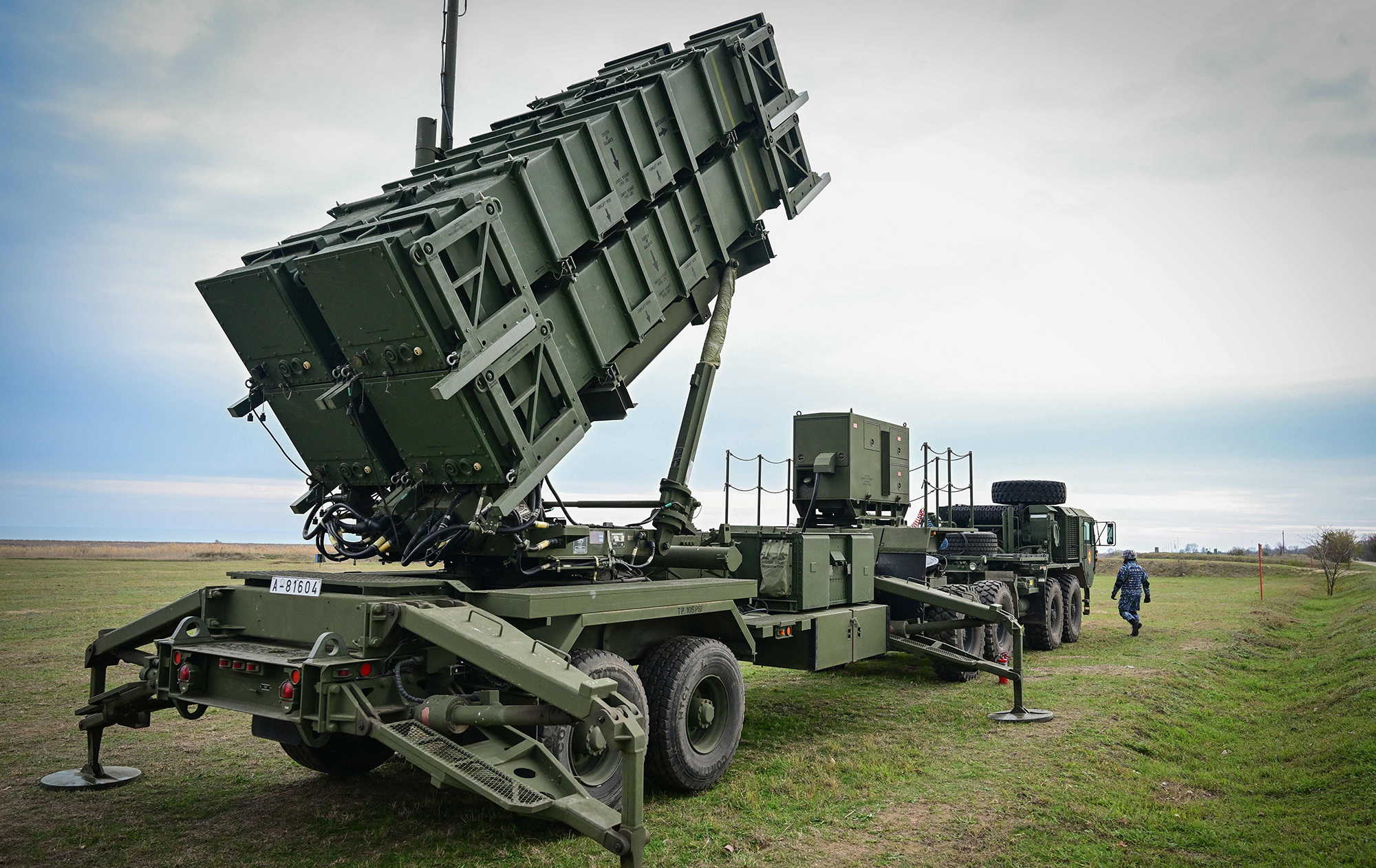
The Romanian Army's Patriot during an army exercise at the Capu Mida training ground near the Black Sea, November 15, 2023 (Photo: Getty Images)
Bucharest is trying to occupy its unique niche and get the most out of it.
"Romania is aware that it is not the first Black Sea state. The Turkish navy is stronger. But at the same time, they are still trying to claim at least a serious power and compensate for the lack of weapons with political influence," Serhiy Gerasymchuk, Deputy Executive Director of the Foreign Policy Council Ukrainian Prism, emphasizes in an interview with RBC-Ukraine.
However, all these changes occurred only with the beginning of Russia's full-scale invasion.
Why Romania changed its position
Traditionally, relations between Romania and Ukraine have been tense. Bucharest has frequently employed nationalist rhetoric, though not as sharply as Hungary, for instance.
Ukraine and Romania truly got to know each other on a cultural level and through people-to-people contacts only after Russia's full-scale invasion. According to the Romanian government, in the first year of the invasion, 3.8 million Ukrainians entered the country, though most of them later moved on to other European nations.
"They were received very warmly, and I remember the first days of the invasion when photos of the bridge between Ukraine and Romania, where Romanians brought toys for Ukrainian children, went viral on the internet," said Serhiy Herasymchuk, Deputy Executive Director of the Foreign Policy Council "Ukrainian Prism," to RBC-Ukraine.
Like in other European countries, Romania saw a surge in volunteer activity. The Romanian political scene also changed for various reasons.
"I increasingly hear from Romanian colleagues that supporting Ukraine is essential because the prospect of Russia on the Prut River, i.e., on Romania's border, is unacceptable. The second factor is the realization that Ukraine is also a key factor in preserving Moldova's sovereignty," Herasymchuk explained.
The Russian enclave of Transnistria remains a significant factor for Ukraine's Odesa region and Moldova.
Additionally, the policies of NATO and EU allies, who began developing strategies to support Ukraine in which Romania played a key role, especially due to its geographical location, have influenced the evolution of views within the Romanian establishment.
"Romanian politicians have always sought to maintain very good relations with EU and NATO member countries and to be perceived as full-fledged members of these organizations on the European political scene," said Mihai Isac.
According to him, the United States' position on Ukraine should also be highlighted separately. Romania considers itself the most important American ally in the Black Sea region. Finally, the traditionally pro-American sentiments among Romanians and politicians should not be overlooked.
"The historical memory of how Romanians suffered under Tsarist, Soviet, and Russian policies also played a significant role in changing views on Ukraine today in Romania," Isac added.
Problems on hold: Economy and national minorities
There are several issues between Ukraine and Romania that previously caused tension, which have now taken a back seat but may resurface in the future.
The first issue is economic. Ukraine competes with Romania for European Union markets, as it does with other countries in the region. While resolving the conflict with Poland was difficult, Romania has been more open to dialogue. Last year, when Poland and other western neighbors blocked Ukrainian agricultural exports, Bucharest was one of the first to propose resolving the issue bilaterally through a separate memorandum.
Moreover, unlike Poland and other states, Romania stated that its position does not contradict the European Commission's. In September 2023, the European Commission and Ukraine reached a compromise under which the ban on importing Ukrainian grain was not extended. Instead, Ukraine committed to presenting a plan of measures for export control.
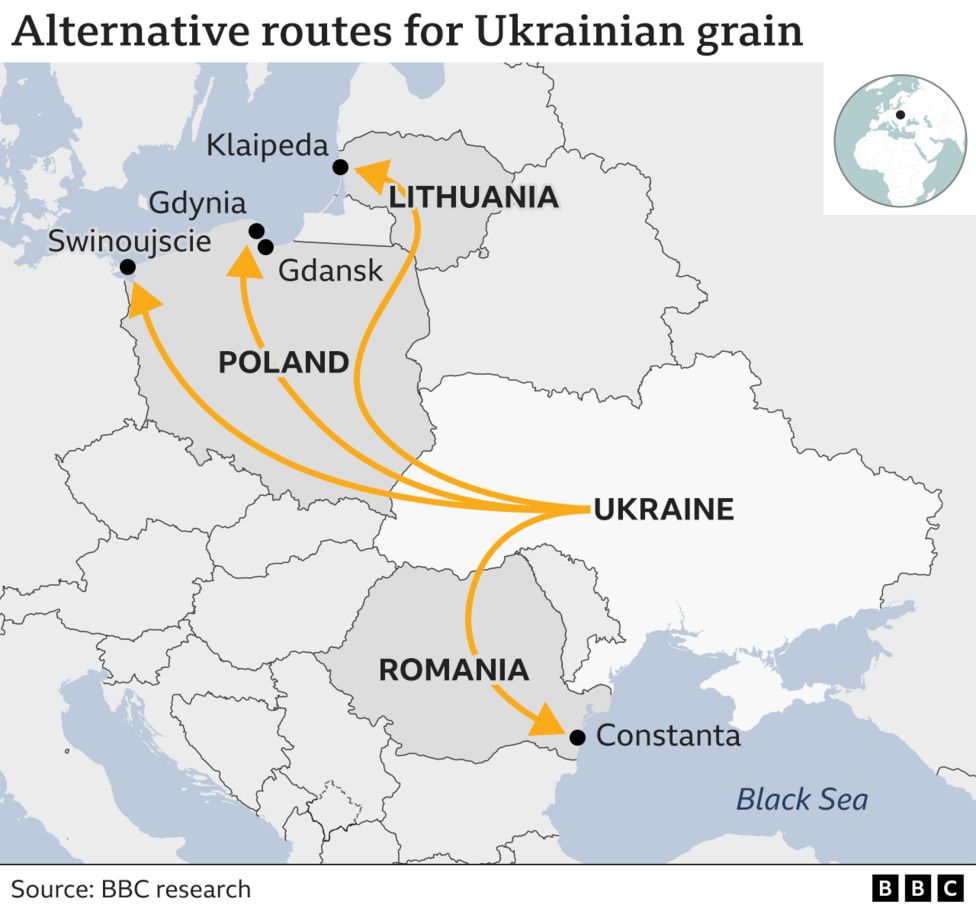
Alternative routes for Ukrainian exports. One of them is through the Romanian port of Constanta. (map: BBC research)
As a result, Romania benefited, as part of the Ukrainian cargo began to be shipped through the port of Constanța.
In the future, disputes may re-emerge, especially if the European Union raises the issue of redistributing financial flows from funds supporting agriculture. Currently, a significant portion of these funds goes to Romania, Poland, and other Central and Eastern European EU members.
Another factor is the Romanian national minority in Ukraine. Similar to Hungary, this issue became more acute in 2017 after the adoption of education law. However, Romania did not issue ultimatums to Ukraine and instead pursued the path of preparing specific protocols concerning education in Romanian schools.
According to Mihai Isac, Romanian politicians understood it was not the time to blackmail Ukraine with these issues during the war.
"There is a deep concern regarding Romanian minorities in Ukraine, and Romania hopes that after the war, its positions and help provided to Ukraine will help during future negotiations," says the expert.
Furthermore, Bucharest is counting on Ukraine improving its legislation on national minorities as it progresses toward EU membership. Romania itself did the same when it joined the EU.
For now, Romania has positively received another "gesture." In October last year, Ukraine abandoned the term "Moldovan language" and recognized that the official language of Moldova is Romanian. This stance is also held by the current Moldovan government.
Situation in Romania and how it might affect support for Ukraine
Romania faces a new stress test with elections at the end of this year: presidential elections on November 24 and parliamentary elections on December 1.
"If we talk about the mainstream political forces currently forming the coalition, namely the Social Democratic Party and the National Liberal Party, they are fully aligned in supporting Ukraine. I don't see this situation changing," says Serhiy Herasymchuk.
However, a troubling sign is the growing popularity of the far-right populist parties Alliance for the Union of Romanians (AUR) and S.O.S. România. The latter is represented by the notoriously scandalous MEP Diana Șoșoacă. Due to her inappropriate behavior, she was even expelled from a European Parliament session. Now Șoșoacă plans to bring a priest to the European Parliament to cleanse the building of "devils."
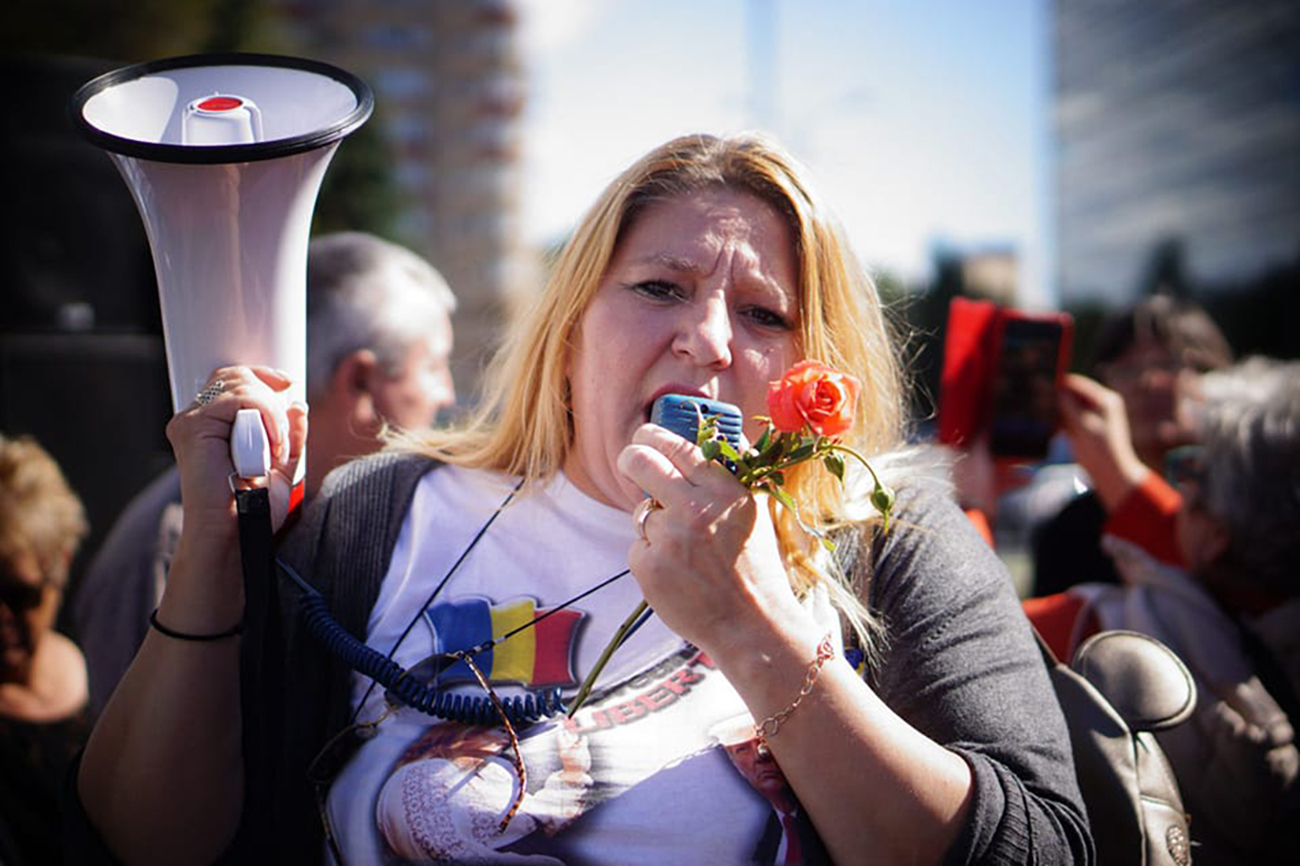
Romanian Member of the European Parliament Diana Șoșoacă (photo: Șoșoacă's Facebook)
According to polls as of mid-August, the Social Democrats lead with a rating of 33%, the National Liberals have 23%, while AUR is gaining 16%, and S.O.S. has 5%.
The far-right in Romania, as in the rest of Europe, exploits the government's weaknesses and nationalist rhetoric, and while the Kremlin's influence has diminished, it still remains.
"Russian propaganda in Romania uses Putin's image and plays the card of hatred between Romania and Ukraine, utilizing 'pan-Orthodox' rhetoric that affects some segments of our population. Another part of this propaganda is quite subversive, as it plays on Romania's historical memory, trying to equate Russian policy towards Romania with Ukraine's stance," notes Isac.
However, at least for now, the threat from the far-right in Romania is minimal.
"I get the impression that the mainstream parties, specifically the National Liberals and Social Democrats, have agreed that it's not worth working with AUR. This somewhat resembles the behavior of German parties towards the Alternative for Germany party. The party gains a significant percentage but remains isolated," says Serhiy Herasymchuk.
Similarly, no surprises are expected in the presidential election. Not all candidates have announced their participation, but the three main ones are to continue Romania's current course. These are Nicolae Ciucă from the National Liberals, Marcel Ciolacu from the Social Democrats, and Mircea Geoană, who previously served as NATO's Deputy Secretary-General and is trying to return to Romanian politics.
Supporting Ukraine and acting in concert with NATO partners is in Romania's long-term interests. And there is almost complete consensus on this in Bucharest.
Sources: public statements by Ukrainian and Romanian politicians, statistical data, and sociological surveys, as well as comments from Romanian international affairs expert Mihai Isac and Deputy Executive Director of the Foreign Policy Council "Ukrainian Prism" Serhiy Herasymchuk.
